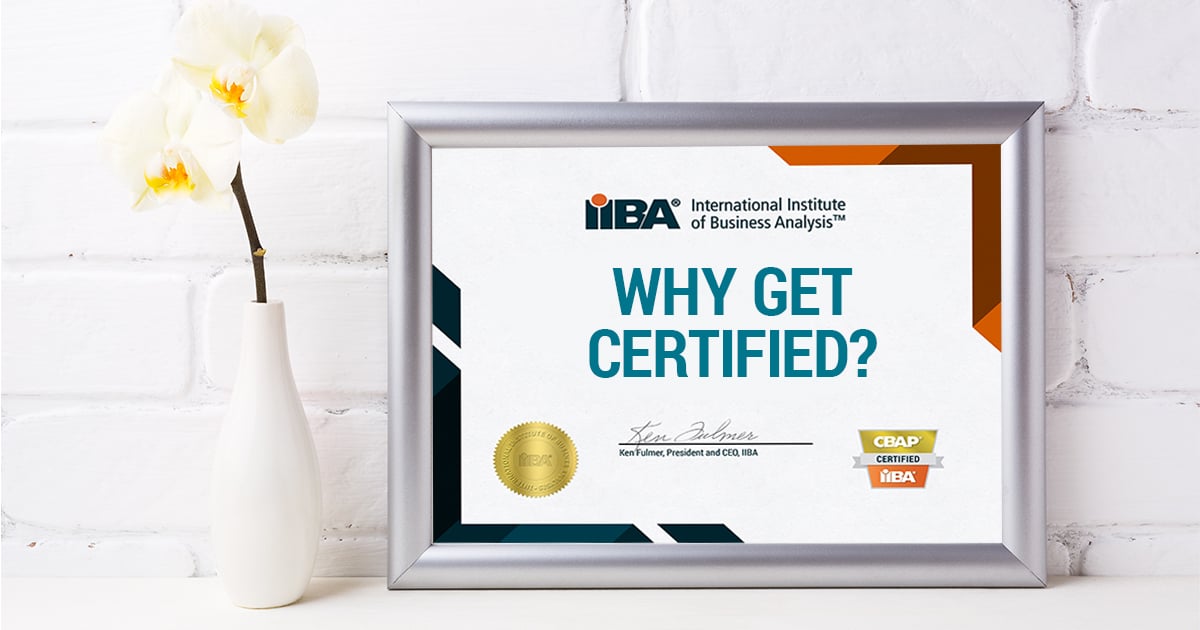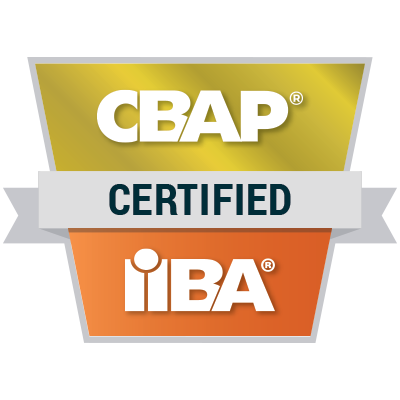Why Get Certified? | Answering Your Questions
IIBA’s recent public webinar, Why Get Certified? with panelists Michael Roberts, Director of Customer Engagement at ASPE and Michael White, founder and president of The Business Analysis Doctor, LLC covered a lot of questions about certification, but the panelists ran out of time to answer them all! When you consider all the reasons why people pursue certification the overwhelming reason why individuals seek certification tends to be to validate their knowledge and increase their confidence and sense of fulfillment in their work.1

IIBA’s 2019 Global Business Analysis Salary Survey found that “Business Analysis professionals who hold at least one certification earn 11% higher than non-certified individuals.1 This indicates that employers recognize the value of certifications. But again, respondents report their main reason for getting certified is to increase their confidence at work.
Below is a recap of some of the questions that the panelists were not able to respond to during the Q&A time allotted:
Q: With the trend towards companies going Agile, will there be more emphasis on the role of a product owner vs a traditional BA role? How does the BA role fit with a PO or Product Manager role in an agile environment?
A: Organizations today are looking for professionals with the competencies, skills and ability to learn and keep pace with technology. Drawing upon the Knowledge Areas (KAs) covered in A Guide to the Business Analysis Body of Knowledge® (BABOK® Guide) provides a solid foundation for moving into new areas and the Agile Extension to the BABOK® Guide supports IIBA’s Agile Analysis Certification (IIBA® - AAC) certification for professionals working in agile. IIBA’s AAC recognizes your ability to collaborate and transform project delivery in an agile environment.
Q: Does AAC prepare a BA to work in Scaled Agile?
A: Yes, many of the roles in SAFe require BA competencies. The Agile Analysis Certification recognizes your ability to apply effective business analysis with an agile mindset and a constant focus on delivering business value.
Q: Any tips for BAs starting in SAFe?
A: BA skills needed to work in SAFe include experience writing User Stories and Acceptance Criteria, experience in automating acceptance testing, Domain Modelling, Feature Analysis and Dependency Analysis, Value Stream, Enterprise Analysis and experience leading programs and facilitating at scale.
Q: Is CBAP certification good for professionals aspiring to Product Management roles?
A: In the BA Times article, The Product Manager Role That Is On The Business Analysis Career Ladder 2 it says that product managers make decisions while business analysts are responsible for making sure the decisions get made; the role of business analysis in product management will leverage your BA experience and the skills required to earn your CBAP® certification.
Q: Is CBAP still relevant in the digital age?
A: Digital is changing how businesses work and the roles of those managing the projects. The BA role is evolving, and today’s BA needs to be storytellers, communicators, problem solvers, critical thinkers, leaders, have customer experience skills and be decision makers. The role still requires traditional skills but required competencies are changing. However, all of these important skills are still part of the CBAP competency-based certification. Validating your experience makes you more marketable and the skills are transferable in other roles.
Q: How does certification help position you to move from BA work in one industry (legal/professional services) to another industry (financial)?
A: Business analysis skills are transferable to different roles in different industries. This transfer of skills is reflected in the expanded and essential role of BAs in leading change and playing a more strategic role in business management.
Q: I worked in different countries such as Morocco, France and now Canada and I find that the roles of a business analyst are not exactly the same and even the job title is sometimes different.
A: This is a common occurrence even within the same country, all over the globe. The key here is to focus on the job descriptions. Business analysts are equipped with many transferrable skills, so think about business analysis as a practice, rather than business analyst as a title.
Q: What role do you see business analysis playing in the machine learning and AI space?
A: There will always be a “personal” side to machine learning and AI. In addition, there will be concerns around regulations and ethics when it comes to these things. Business analysis could certainly be leveraged when it comes to these perspectives.
Q: What is the difference between CBAP and PMI-PBA certification in terms of scope and capability requirements?
A: IIBA CCBA®, CBAP® and PMI-PBA certifications are competency based, IIBA certifications cover a broader business analysis perspective and organizational activities. If you are thinking of a mid-career level (3 years of business analysis experience) consider CCBA certification. If you have 5 years or more experience both the CBAP and PMI-PBA validate your years of experience, knowledge and capabilities; CBAP requires business analysis experience, plus a minimum of 900 hours completed in four of the six BABOK® Guide Knowledge Areas (KAs), for a total of at least 3,600 of the required 7,500 total hours. Check IIBA’s CBAP page for sample exam questions and the exam blueprint.
Q: What is the role of business intelligence in business analysis? How is this covered in CCBA or CBAP certifications?
A: Business intelligence and business analytics is growing as a specialization of business analysis. Data analysis used in the business context must tell a story, and the business analyst is well-positioned to play a major role. Read the Members Introduction to BDA: a Practitioner's View and Members Introduction to BDA: an Organizational View. IIBA also offers the CBDA certification.
For general questions related to ECBA, CCBA and CBAP exams and any pre-requisites, please visit IIBA Certifications. You’ll find sample questions and blueprints for each exam to give you an idea of what knowledge and experience in business analysis you should have before writing the exams. You can check with your local IIBA Chapter for a study group, self-study using the BABOK® Guide (IIBA members can reference the new interactive edition) or you can register for an Endorsed Education Provider (EEP™) course to help you prepare. IIBA competency-based certification exam questions are designed to test your experience, capabilities and knowledge.
To help you complete the exam application refer to the ECBA, CCBA and CBAP Core BA Certification Handbook for tips to complete your work experience and other questions on the online form.
If you need help convincing your boss about the value of certification, share research resources including IIBA whitepapers and salary survey results that show how projects and programs benefit from business analyst's expertise.
CBAP certification now available online, why wait? Get started today!
